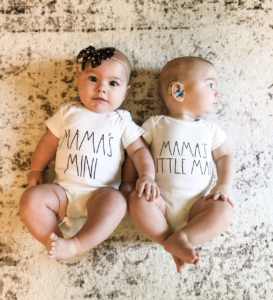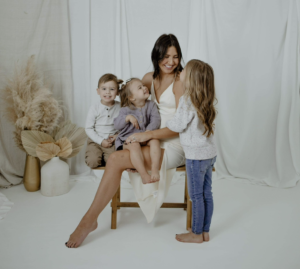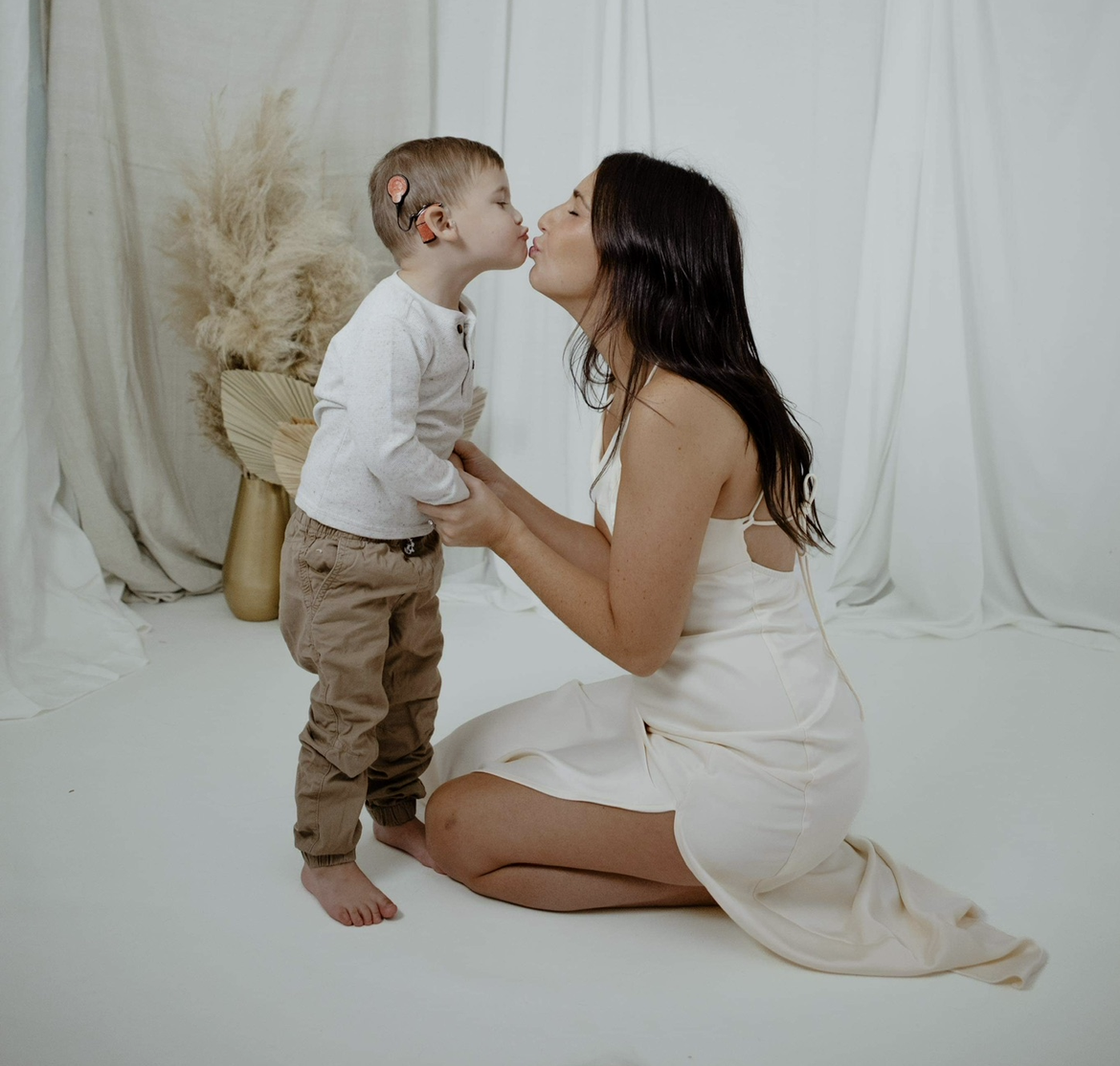How Brooke Barnes’ experience with her own child’s newborn hearing screen led her to become a screener herself.
By Kirsten J. Ballard

When Brooke Barnes learned her son Mason failed his newborn hearing screening, she burst into tears. She needed to find answers, what she didn’t expect to find was a career.
It was March 2020 and Brooke had just given birth to her twins, Millie and Mason, via C-section. Millie passed her hearing screen but Mason failed both of his.
“I cried. I was like, no, something’s wrong, I don’t know if I had a gut feeling or it was just hormones,” she says. Hospital staff assured her it was probably just fluid.
Brooke followed up with an audiologist two months later and did an ABR and found Mason was profoundly deaf. “I wasn’t expecting that, I was told it was just fluid,” she says.
She immediately went into problem solving mode. “I found out about the cochlear implants, I’m joining Facebook groups, I’m researching,” she says. “I always say that this changed me for the better. I stand up for my kids, it taught me how to advocate.”
Mason was fitted with hearing aids and received cochlear implants at six months old.
“I had to push for that,” she says. “They usually don’t do them until nine months, but we did and insurance approved.”
Last year, an email from Indeed.com arrived in her inbox with a listing for “newborn hearing screener.” Brooke assumed she’d be ruled out by not having a medical degree. Instead, she fit all the qualifications. She interviewed and shared her story. She got the job.
Brooke loves her job and getting to see all the babies. She says she’s never had another parent react the way she has in her year on the job. For Brooke, the worst part of her job is not getting to follow up with parents whose children fail the initial screen.
“I try as much as possible,” she says. “After they fail two [screens] in the hospital, we do an outpatient screen the week after. I tell parents to give it that week to let any fluid pass, especially if it’s a C-section baby. After that week, that’s when we start to get concerned and think there’s a possibility of hearing loss and then we refer to the audiologist. I don’t really get to see anything else from there.”
Most of the time though, newborns pass the screening. “It’s hard [for parents] to see the reason behind the screening. But that’s literally Mason. So anybody who tries to refuse a screen, my boss uses my story as an example of why the screens are so important,” she says. “Doing our screen affected us so positively, but finding out so early. He would have never been able to get hearing aids and Cochlear Implants so early if we hadn’t done the newborn hearing screen.

Mason got both implants done at the same time. “He was overwhelmed at activation, he was six months old and had never heard in his life, so that’s obviously warranted but he adapted really quickly, with him being just so little. Their brains are just so adaptive and it’s just been awesome to watch him grow.”
Now a vibrant three year old, Mason is speaking and also learning to advocate for himself. “He tells me what he wants now and he has an attitude if he doesn’t get what he wants and he likes to tell me about it. He’s doing really well,” Brooke says.
“There’s no telling how long it would be until I found out because I would do the at-home test, I’d stomp on the ground and he would flinch and I was like, ‘Oh, he heard that, but really it was just the vibrations.’”
De la cuna a la profesión
Cómo a través de la experiencia con el cribado auditivo neonatal de su hijo, Brooke Barnes se convirtió en «cribadora»
Por Kirsten Ballard

Cuando Brooke Barnes se enteró de que su hijo Mason no había superado el cribado auditivo neonatal, rompió a llorar. Necesitaba respuestas y lo que no esperaba era encontrarse con una profesión.
En marzo de 2020, Brooke dio a luz a sus gemelos, Millie y Mason, por cesárea. Millie superó el cribado auditivo pero Mason no superó ninguno de los dos cribados que le realizaron.
«Me puse a llorar. Sentí que algo andaba mal, no sé si por un presentimiento o por mi estado hormonal», explica. El personal del hospital le aseguró que probablemente se trataría de líquido acumulado.
Dos meses después, Brooke llevó al niño a un audiólogo que le realizó una prueba de potenciales evocados auditivos del tronco cerebral (PEATC) y descubrió que tenía una sordera profunda. «No me lo esperaba; me habían dicho que solo era líquido», dice.
Inmediatamente, entró en modo de resolución de problemas. «Descubrí los implantes cocleares, me uní a grupos de Facebook y me puse a investigar», añade. «Siempre digo que todo esto me cambió para mejor. Defiendo a mis hijos y aprendí la manera de reivindicar sus derechos».
A Mason le pusieron audífonos y recibió implantes cocleares a los seis meses.
«Tuve que insistir», asegura. «Normalmente no los reciben hasta que tienen nueve meses, pero nos lo propusimos y el seguro los aprobó».
El año pasado, llegó a su bandeja de entrada un correo electrónico de Indeed.com con un anuncio de «evaluador auditivo de recién nacidos». Brooke supuso que la descartarían por no poseer una licenciatura de médico pero, sin embargo, cumplía todos los requisitos. Se presentó a la entrevista, contó su relato y consiguió el puesto.
A Brooke le encanta su trabajo y evaluar a todos los bebés. Comenta que, en el año que lleva trabajando, no ha visto que ningún progenitor haya reaccionado de la forma en que ella lo hizo. En opinión de Brooke, lo peor de su trabajo es no poder realizar un seguimiento de los padres cuyos hijos no superan el cribado inicial.
«Lo intento en la medida de lo posible», afirma. «Cuando no superan dos [cribados] en el hospital, realizamos un cribado ambulatorio la semana siguiente. Les digo a los padres que dejen pasar esa semana para que salga el posible líquido acumulado, especialmente si se trata de un bebé nacido por cesárea. Una vez transcurrida la semana, empezamos a preocuparnos y a pensar que existe la posibilidad de una pérdida auditiva, por lo que derivamos al niño a un audiólogo. A partir de entonces, les pierdo la pista».

No obstante, en la mayoría de las ocasiones, los recién nacidos superan el cribado. «Es difícil [para los padres] entender la razón del cribado, pero a mí me pasó con Mason. De esta manera, cuando alguien intenta rechazar un cribado, mi jefe me pone de ejemplo para explicar el motivo de que los cribados sean tan importantes», comenta. «En nuestro caso, el cribado fue una experiencia positiva porque nos permitió descubrir pronto el problema. Si no se le hubiera realizado el cribado auditivo neonatal, a Mason nunca le habrían puesto audífonos ni implantes cocleares tan pronto».
Mason recibió los dos implantes al mismo tiempo. «Se le veía abrumado por la activación, ya que tenía seis meses y no había oído antes en su vida, así que obviamente estaba justificado, si bien se adaptó con gran rapidez aun siendo tan pequeño. Sus cerebros son tan adaptables y es maravilloso verlo crecer».
Ahora que tiene tres años, Mason habla y está aprendiendo a defenderse por sí mismo. «Me dice lo que quiere en un momento dado, se contraría si no lo consigue y le gusta contármelo. La verdad es que evoluciona muy bien», concluye Brooke. «No se pude saber cuánto tiempo habría pasado hasta darme cuenta de su pérdida auditiva, si bien no dejaba de realizar pruebas en casa; por ejemplo, dando patadas en el suelo y viendo cómo el niño se sobresaltaba. Yo pensaba que las oía pero en realidad solo notaba las vibraciones».

